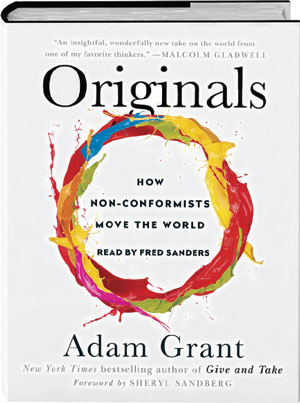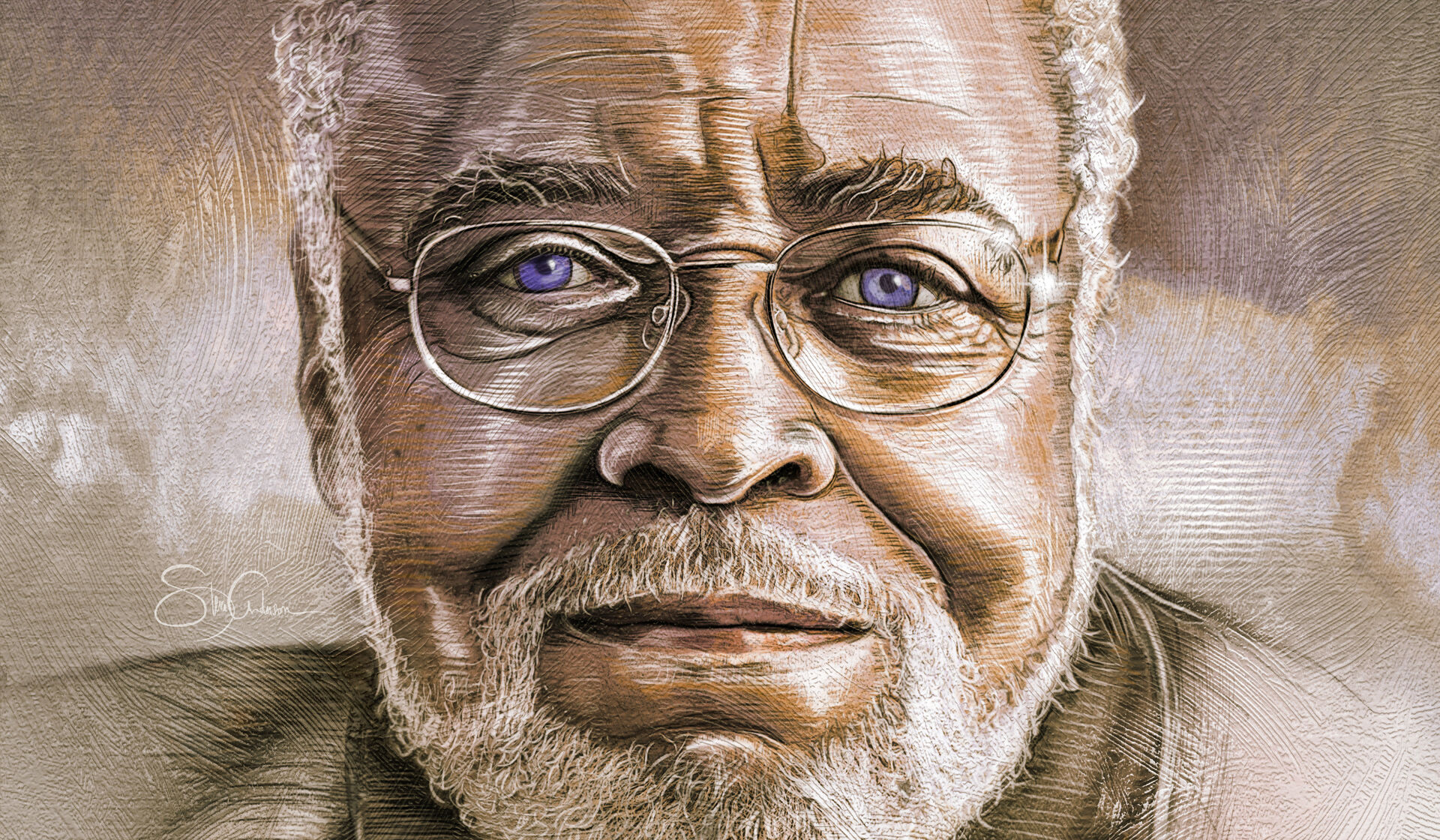To promote his new book, “Originals: How Non-Conformists Move the World,” Adam Grant crisscrossed continents last winter. From Los Angeles to London, he took part in a number of conversational events with rock stars of the new economy. In California, he spoke with Facebook COO Sheryl Sandberg and LinkedIn co-founder Reid Hoffman. And in New York, he was particularly well-paired with fellow thought leader Malcolm Gladwell, the best-selling author of “The Tipping Point.”
Grant, MS’05, PhD’06, is the youngest tenured professor at the University of Pennsylvania’s Wharton School, where he teaches leadership, teamwork, negotiation, and organizational behavior. But he is well-known as the author of two New York Times best sellers. “Originals” hit the list just two weeks after its February publication, while his earlier book, “Give and Take: Why Helping Others Drives Our Success,” was translated into 27 languages.
“Many people fail to achieve originality because they generate a few ideas and then obsess about refining them to perfection.”
Gladwell opened the hour-long discussion with Grant — which included topics ranging from how we select college students to how we select presidents — with an oddly challenging question. “The one subject that is scrupulously absent from your books,” Gladwell said to Grant, “is anything personal. Why is that?”
Grant answered that he is “more fascinated by other people’s experiences than my own.” But it was apparent that the 900 paying fans at the 92nd Street Y were there to learn how Grant, 34, had become an “original” himself, as he is hardly your average business professor.
In addition to teaching and writing books, Grant also contributes Op-Ed columns to The New York Times and works as a speaker and consultant for such notable clients as Google, Johnson & Johnson, Goldman Sachs, and Disney Pixar. As if that weren’t enough, earlier in his life he was a successful advertising director, a professional magician, and a Junior Olympic springboard diver.
In “Originals,” Grant synthesizes his own research, and that of other social scientists whose work spans the worlds of business, sports, politics, and entertainment, to show how originality can be “launched, unleashed, and sustained” to create “trailblazers.”
But what most intrigues his readers is the counterintuitive wisdom he preaches. “It’s widely assumed there’s a trade-off between quantity and quality — if you want to do better work, you have to do less of it — but that turns out to be false,” he writes. “In fact, when it comes to idea generation, quantity is the most predictable path to quality . . . . Many people fail to achieve originality because they generate a few ideas and then obsess about refining them to perfection.”His findings on raising children are particularly provocative. He states that child prodigies rarely grow up to be innovators. “As they perform at Carnegie Hall, win the science Olympics, and become chess champions, something tragic happens,” he writes. “Practice makes perfect, but it doesn’t make new.”
 His research also uncovered that rebellious adolescents often change the world. “The people who became successful entrepreneurs were more likely to have teenage histories of defying their parents, staying out past their curfews, skipping school, shoplifting, gambling, drinking, alcohol and smoking marijuana,” he writes.
His research also uncovered that rebellious adolescents often change the world. “The people who became successful entrepreneurs were more likely to have teenage histories of defying their parents, staying out past their curfews, skipping school, shoplifting, gambling, drinking, alcohol and smoking marijuana,” he writes.
Grant, ironically, admitted in an interview with Michigan Alumnus that he was the opposite in his youth. “I have never had a sip of alcohol or touched drugs or an illegal substance,” he said. During his high school years in suburban Detroit, he was instead devoted to competitive diving.
Though he gave up the pool as an undergraduate at Harvard to focus instead on academics, he is still involved in the world of sports. One past client is the NFL, who hired Grant to teach its player-engagement directors how to better motivate the athletes.
Grant, whose mother also went to U-M and who “grew up bleeding Maize and Blue,” shared his radical view on college football. “I would change it to flag football immediately. I am totally serious about that. It’s a very dangerous sport,” he said, acknowledging that his opinion is out of the mainstream.
“It can be embarrassing to be a nonconformist, but it is our best chance to improve the world around us. If we don’t, we are basically accepting the world as it is.”
How Adam Grant Defines “Originality”
In his new book, “Originals: How Non-Conformists Move the World,” Adam Grant offers his take on originality.
“Originality is taking the road less traveled, championing a set of novel ideas that go against the grain but ultimately make things better.”
“Originality itself starts with creativity: generating a concept that is both novel and useful. But it doesn’t stop there. Originals are people who take the initiative to make their visions a reality.”
“The hallmark of originality is rejecting the default and exploring whether a better option exists.”
“To become original, you have to try something new, which means accepting some measure of risk. But the most successful originals are not the daredevils who leap before they look. They are the ones who reluctantly tiptoe to the edge of a cliff, calculate the rate of descent, triple-check their parachutes, and set up a safety net at the bottom just in case.”
“Ultimately, the people who choose to champion originality are the ones who propel us forward. They feel the same fear, the same doubt, as the rest of us. What sets them apart is that they take action anyway. They know in their hearts that failing would yield less regret than failing to try.”
Dan Shaw is a frequent contributor to The New York Times.





